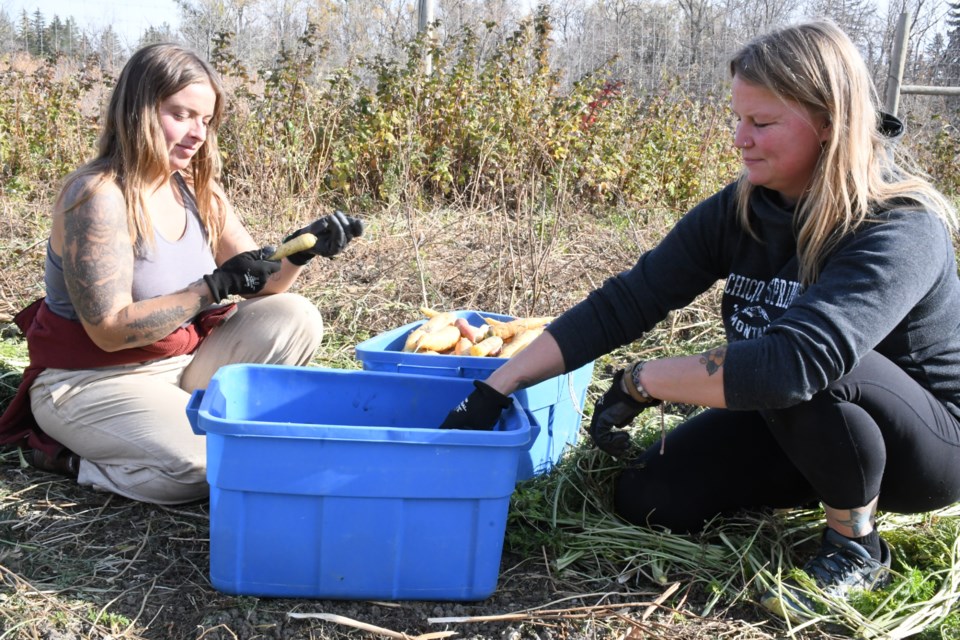Organizers of the Mosaic Food Farm grew new types of produce this year, which they say was fun to do and contributed to another successful growing season.
Most of the garden — located near Wellesley Park — had already been harvested when the Moose Jaw Express visited recently. Garden co-ordinator Keri Fox and master gardener Maisie Riendeau were collecting carrots into a large tub so they could wash them later.
This year went very well and was another great success, Fox said.
The food farm produced about 14,500 pounds of food — compared to over 16,000 pounds last year — that will be distributed to organizations like the food bank, Riverside Mission, Moose Jaw Transition House, Hunger in Moose Jaw and the Multicultural Centre, she continued.
One reason they grew less is that they attempted to grow new vegetables such as cantaloupe and watermelon, Fox said. They also grew different varieties of squash and pumpkins, which weren’t as heavy but were of a tastier variety.
While the weight and quantity may have been less, it was still a good decision to grow new things, she added.
“We got more rain this year,” said Riendeau. “And we got it earlier (in the season), so it just helped everything establish.”
The rain ensured that gardeners didn’t have to rely as much on city water, which has chlorine and is hard on the plants, said Fox. In comparison, rainwater has minerals such as nitrogen that fertilize plants and help them grow better.
There was also less intense heat than last year, which also helped, she added. However, tomato yields were down somewhat because that vegetable likes heat.
This year’s quality was great, with potatoes and carrots growing bigger than usual and peppers producing larger yields on fewer plants, Fox said. She chalked up this quality growth to the early rains.
The gardeners also used compost material from a community business, which had a positive effect.
“And his compost is the best compost I’ve ever used. That really made a big difference, too,” she continued. “… I’m so impressed with that compost. I’ve never used it from that guy before.”
Riendeau and Fox enjoyed all aspects of the growing process, from the sunshine and being outside to donating the food and seeing the excitement on people’s faces.
“We both love plants. We’re like big plants nerds and like spending time with them,” laughed Fox.
Both green thumbs also enjoyed learning how to grow new vegetables and using their knowledge. Other new foods they grew were asparagus, raspberries, and cucumbers — all of which did well.
The gardeners decided to grow new produce because it’s good for the soil, said Riendeau, adding that “variety is the spice of life.”
Different vegetables also have varying nutrient content, compared to store-bought food, which looks the same and lacks important nutrient content, Fox said. For example, the food farm grew various colours of tomatoes and peppers, which have higher levels of nutrients and are healthier.
One challenge the gardeners faced was a major frost in June, which killed 800 bedding plants, said Fox. However, Windmill Greenhouses donated hundreds of plants after learning about the loss and sold others at one-tenth of the cost.
“She really came through for us,” Fox added.
Another challenge was mildew on zucchinis, which occurred because there were no late-season rains to keep the plant’s leaves wet, added Riendeau.
The organization plans to address that problem next year by installing oscillating sprinklers on tall stakes.
The gardeners are already planning how the food farm will look next year. They plan to rotate crops because planting the same thing in the same spot robs that area of nutrients, while there could be a disease that kills.
“Like the quantities and stuff that we’re growing, I think we have a pretty good system figured out,” added Fox. “So, we’ll probably do something similar.”




